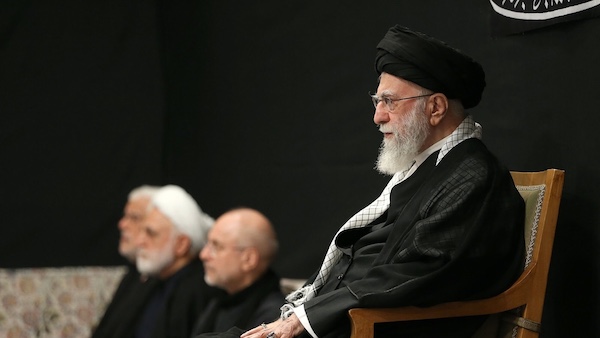In June 2025, while indirect negotiations between Iran and the United States were still underway, Israel, soon followed by the U.S., launched a military attack on Iranian territory. The attack, met with a 12-day Iranian response of surprising scale and coordination, marked not just an escalation in Middle Eastern tensions but also a deep rupture in the international order and the credibility of the Western-led global system.
The most striking fact was not merely the military dimension of the attack, but its timing: it happened in the midst of ongoing diplomatic dialogue. Communication channels were open, and discussions of sanction relief were still in the air. This context makes the aggression not just a violation of Iranian sovereignty, but a devastating blow to the very idea that diplomacy with the West is possible or meaningful. It was a declaration that no legal, moral, or institutional restraint can contain the imperatives of power in the Western geopolitical imagination.
JCPOA “snapback mechanism”
In this light, the potential reactivation of the so-called “snapback mechanism” scheduled for October 2025 becomes a bitter irony. Designed under the JCPOA framework to reinstate UN sanctions in case of Iranian non-compliance, it was once intended as a tool of last resort. But now, after a preemptive military strike before any formal violation or legal justification what legitimacy does such a mechanism still carry?
Legally, it is redundant. Strategically, it is irrelevant. But psychologically and politically, it exposes a fracture that affects the global order. Should Western powers invoke it again, they would not just target Iran, but would send a chilling message to the Global South: Even if you negotiate, even if you compromise, your sovereignty is still disposable. No matter how you comply, your destruction remains on the table.
Iran’s experience is neither unique nor unprecedented. It follows a familiar pattern. Muammar Gaddafi in Libya dismantled his country’s nuclear program, sought reconciliation with the West, and was ultimately bombed into oblivion. Syria made limited overtures, and yet endured foreign-sponsored attempts at fragmentation and the continued violation of its territorial integrity. In contrast, North Korea chose confrontation, developed nuclear capabilities, and has been spared military invasion ever since. The message is clear: submission does not bring security, only vulnerability.
Some might ask, did Iran not see this coming? Was it naïve to enter into negotiations again? On the contrary, Tehran’s leadership and strategic community have long internalized the unreliability of the West. But Iran’s re-engagement had another goal: not to achieve results, but to remove excuses. By entering talks, Tehran signaled openness. By remaining committed to dialogue, it denied its adversaries the propaganda tool of blaming Iran for the collapse of diplomacy. And yet, it was attacked.
“Rules-based international order” unmasked
This paradox has now reshaped the narrative. For the first time in decades, a regional power was militarily assaulted during active negotiations; not for escalating tensions, but rather, in spite of de-escalating them. The result is not merely the erosion of Western credibility; it is the unmasking of the imperial logic behind the so-called “rules-based international order.”
In such an environment, any future invocation of legal tools, like the snapback mechanism, will not restore order; it will deepen cynicism. For the BRICS countries and other emerging actors, this episode offers a defining lesson: power outside the Western system must be built, because within it, there are no guarantees. Security, sovereignty, and strategic autonomy cannot be brokered within a framework designed to preserve the dominance of one bloc over the rest of the world.
For Iran, the war was costly. But it also marked a turning point. In twelve days, Tehran demonstrated deterrence, resilience, and strategic maturity. While Western media attempted to downplay the significance of Iran’s response, the reality on the ground, including symbolic and material support from Asian partners showed that Tehran is no longer isolated.
Moreover, Iran’s position within multipolar institutions such as BRICS has only deepened. If the West insists on reviving punitive mechanisms, it will ironically accelerate the global shift toward those very institutions meant to replace it. Every failed diplomatic effort, every illegal sanction, every unlawful attack makes the logic of multipolarity not only more attractive but more necessary.
Instruments of dialogue used for domination
The broader geopolitical lesson is therefore this: The war in June 2025 was not just a regional event. It was a global signal. It showed that the liberal international order has exhausted its moral authority. That the instruments of dialogue once offered as alternatives to war have themselves been weaponized. And most of all, that the façade of legalism cannot hide the brute logic of empire.
Perhaps the snapback mechanism will indeed be triggered. But the real trigger has already been pulled not by diplomats or legal experts, but by the silent awakening of many across the Global South. An awakening that says: trust is no longer an option. Alignment with Western institutions is no longer a privilege, but a trap. And the only viable future lies in strategic self-determination, collective sovereignty, and a world order not dictated, but negotiated.
The question is no longer whether the West can be trusted.
The question is: how many more states must pay the price of trusting it before the world refuses to play this game altogether?
Peiman Salehi is an Iranian political philosopher and international affairs analyst. He writes on civilizational state theory, multipolarity, and critiques of liberalism.

